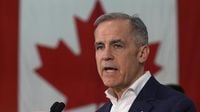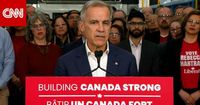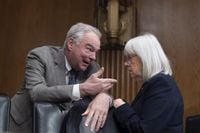On April 1, 2025, Canadian Prime Minister Mark Carney met with Mexican President Claudia Sheinbaum to discuss trade and investment relations between their countries. The two leaders emphasized the importance of protecting North America's supply capacity while respecting each nation's sovereignty, according to a press statement from Carney's office.
During the meeting, Carney outlined his plan to confront unjust trade practices against Canada, aiming to protect Canadian workers and businesses while bolstering the Canadian economy through increased trade with Mexico. This discussion comes at a critical time, as U.S. President Donald Trump is expected to unveil a comprehensive trade policy on April 3, 2025, dubbed "Day of Liberation." Carney previously informed Trump that Canada would implement retaliatory tariffs to safeguard its workers and economy in response to additional U.S. trade measures.
As Canada braces for the anticipated tariffs from the U.S., Carney reiterated his firm stance against allowing these tariffs to further burden the Canadian economy. He stated, "This will never happen," emphasizing that the economy must serve everyone. The head of the European Union has also warned Trump against imposing tariffs on Europe, indicating the broader implications of such trade policies.
Meanwhile, the U.S. Senate is preparing to vote on a resolution aimed at canceling Trump's tariffs on Canadian goods. This move is led by Senator Tim Kaine, who is challenging the controversial trade measures implemented by the Trump administration. The tariffs were initially justified by a national emergency declaration concerning fentanyl trafficking, which critics argue is an exaggerated rationale.
Senator Kaine's resolution seeks to annul the emergency declaration that allows these tariffs, asserting that it is not a legitimate justification for imposing economic penalties on Canada. Critics of the tariffs have pointed out that the fentanyl seizures at the northern border are negligible compared to those at the southern border. In the last fiscal year, only 43 kilograms of fentanyl were seized at the northern border, while over 21,000 kilograms were intercepted at the southern border.
As the Senate prepares for the vote, the political landscape among Republicans is increasingly divided. Some Republican senators are expressing concerns over the economic ramifications of the tariffs, with Senator Steve Daines of Montana stating, "The first victims of the trade war are farmers and ranchers." Senator John Kennedy of Louisiana echoed similar sentiments, highlighting the uncertainty and instability the tariffs could bring to global markets.
In a statement, Trump has insisted that addressing the fentanyl issue from Canada is "vital," reiterating his plan to impose tariffs during the upcoming "Day of Liberation." He claimed on social media, "There will not be a turnaround in a country like the turnaround that happens...in the United States." This declaration signifies Trump's commitment to his aggressive trade policies, which he believes will reshape the American economy.
However, experts and even some within the Republican Party are warning of the long-term consequences of such tariffs. Senator Kaine cautioned that the economic costs will be felt across various sectors, including food, construction, and military contracts. He remarked, "We will pay more for our food products, and we will pay more for construction loans. So people will actually suffer from rising prices for goods and services... It's a big problem."
The proposed tariffs could significantly affect the cost of essential materials imported from Canada, such as wood and components necessary for infrastructure projects. As the Senate vote approaches, the outcome could serve as a litmus test for the Republican Party's support of Trump's trade agenda.
While some Republican leaders have shown limited support for Trump's tariffs, describing them as a "tool" for achieving political objectives like combating drug trafficking, there is a clear divide within the party. Senator John Thune, the Senate Majority Leader, acknowledged the need for tariffs to achieve specific goals but did not express enthusiasm for the approach. "My advice remains the same," he stated, reflecting the cautious sentiment among some Republicans.
The upcoming vote presents a critical moment for the Senate, as it weighs the economic implications of Trump's trade policies against party loyalty. The decision could signal a shift in Republican support for the administration's aggressive stance on trade, especially as concerns grow about the potential for rising consumer prices and disruptions to American industries.
As the political climate evolves, both Canada and Mexico are keenly aware of the stakes involved in these trade discussions. Carney's meeting with Sheinbaum underscores the importance of collaboration between the two nations in the face of increasing protectionism from the U.S. Their commitment to enhancing trade relations could serve as a counterbalance to the uncertainties posed by U.S. tariffs.
The outcome of the Senate vote will not only impact U.S.-Canada relations but also shape the broader narrative surrounding trade policies in North America. With both economic and political ramifications at play, the stakes have never been higher for the leaders involved.







